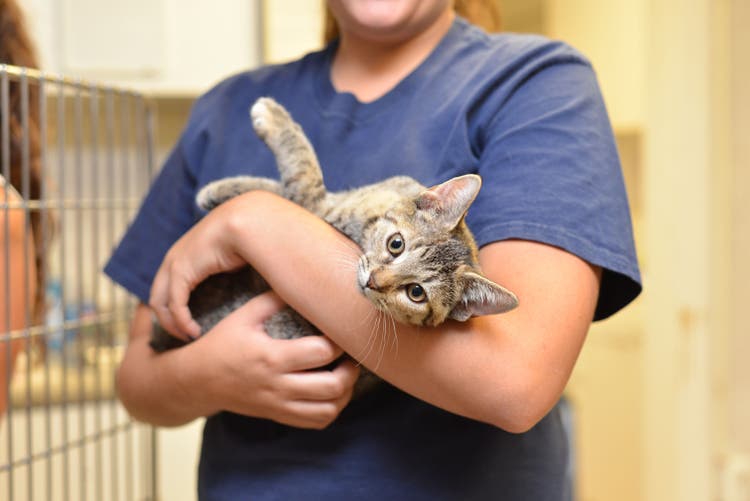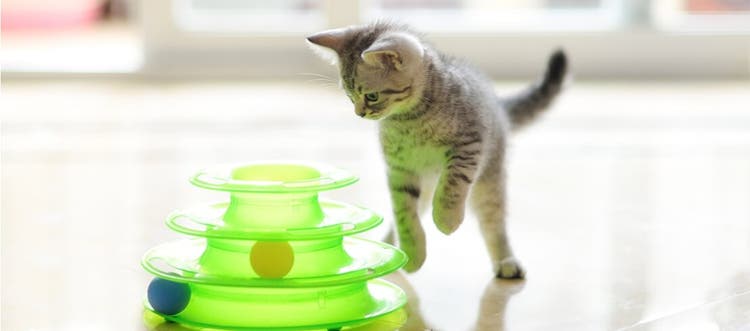What to teach your new kitten.
Some people believe kittens, or cats in general, can't be trained. In reality, these clever creatures are quite trainable. Kittens can even be taught to perform tricks! But before you teach your kitten tricks, start with basic training such as using the litter box and curbing unwanted annoyances like furniture scratching and biting. Here's how to get started.
4 Things to Train a Kitten to Do
How to Socialize a Kitten
Kitten socialization means getting your kitten used to human — and animal — interaction. Start socializing your new kitten right away by handling them every day. Introduce them to the rest of the household. Playing with your kitten gives them an outlet for their abundant energy and can help the two of you bond.
Socialization is also a great time to reinforce the behavior you want to encourage with affection and treats. Above all, don't punish for unwanted behavior. Punishment can actually reinforce undesirable behavior.
How to Train a Kitten to Use the Litter Box
Success with the litter box comes down to patience, perseverance and placement. Situate your kitten's litter box in a quiet place away from noise and human activity, but make sure it's easy to access. Keep their food and bedding away from the litter box. You may need to experiment with a few different types of litter to find one your pet prefers.
To train your pet, place your kitten in the litter box when they wake up and after they eat. Gently move their front paws through the litter in a digging motion. Your kitten will soon get the idea. Throughout the day, watch for signs your kitten needs to use the litter box (pawing around on the carpet, etc.) and deliver them to the box. Don't try to entice your kitten into the box with their favorite toys; the box is for bathroom business, not play. For more litter box training tips, check out our complete guide.
Why Is My Kitten Not Using the Litter Box?
By urinating outside the litter box, your kitten may be telling you they don't like the litter, box size or box placement. Make adjustments and be sure to clean the litter box regularly; it's important to clean the soiled area thoroughly too. If you care for more than one cat, you may need to provide a box for each. Covered boxes or scented litter discourage use by some cats.
Territorial animals, like cats, also urinate to announce their presence to other animals: "This is my turf!" It's a deeply ingrained instinct. Any cat may urinate inappropriately when they feel intimidated by the presence of other pets in the house. Mature male cats, in particular, tend to spray near doors in response to an outdoor cat.
Soiling outside the litter box is not always an easy behavior to stop. It may have any number of causes, including the social dynamics of a multipet household and pet squabbles. It might also signal problems with your cat's urinary system or other health issues. If adjusting the litter box doesn't work, or if soiling marks a sudden change in your kitten's behavior, be sure to see your veterinarian.
How to Train a Kitten Not to Scratch Furniture
Kittens scratch surfaces that offer resistance to trim their claws. Unfortunately, your furniture may seem like the perfect scratching post. To save your carpet and furniture, provide a more enticing scratching surface; a catnip-laced scratching post usually works. You may also prevent unwanted scratching by dabbing the areas you want to protect with a small amount of mint oil; put a bit of oil on a test spot before applying it further.
Again, encouragement gets much better results than punishment. Teach your kitten to scratch a post by gently running their front paws across the surface. When you see them using the post on their own, reward them with a treat.
Trimming your kitten's nails starting at a young age can also help protect your furniture while making the process easier for you and your full-grown cat later on.
How to Train a Kitten Not to Bite
Kittens bite when they play, and play is a good thing — it's a sign of bonding. Never punish bites given during play time or an "attack" at your ankles launched from a hiding spot. This kind of behavior is just your little predator pretending to hunt. Instead, the best way to curb these painful nips is to "play dead" — not moving your hand or foot until your kitten loses interest.
You can also reduce biting by increasing play time. Drag a soft toy attached to a string across the floor and up into the air for your kitten to swat at and pounce on.
Biting can also signal that your kitten is in pain and needs your help, or they may just be having a bad day. It can also warn you that your kitten is preparing to attack more aggressively, especially if you see other aggressive signals like flattened ears, tail thrashing, dilated pupils, hissing or growling. These behaviors tell you it's time to back off. If you are seriously bitten — a bite that draws blood — be sure to get medical attention. Learn more about why kittens bite and how to help prevent it in our guide to kitten biting.
Kittens are complex creatures eager to learn and absorb. Any difficulties they present may have a number of causes, including health issues. When you encounter a problem you can't solve, talk with your vet. Most of the time, though, patience, perseverance and praise will get the desired results.
Related Articles

New Cat or Kitten: Our Downloadable Guide
Thinking about adding a feline to the family? There are so many emotional, social and physical benefits to owning a cat. Check out our free guide, also available to download!





